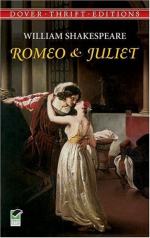|
This section contains 7,608 words (approx. 26 pages at 300 words per page) |

|
SOURCE: "The Name of the Rose in Romeo and Juliet," in The Yearbook of English Studies, Vol. 23, 1993, pp. 126-42.
In the following essay, Belsey observes that Romeo and Juliet is a play about desire, and examines the ways in which culture and language construct erotic longing.
I
Is the human body inside or outside culture? Is it an organism, subject only to nature and independent of history? Or alternatively is it an effect of the signifier, no more than an ensemble of the meanings ascribed to it in different cultures, and thus historically discontinuous? Or, a third possibility, is this question itself reductive, a product of our wish to assign unambiguous causes and straightforward explanations?
When it comes to sexual desire, our culture is dominated by two distinct and largely contradictory models, both metaphysical in their assumption that we can identify what is fundamental in human nature. One...
|
This section contains 7,608 words (approx. 26 pages at 300 words per page) |

|


